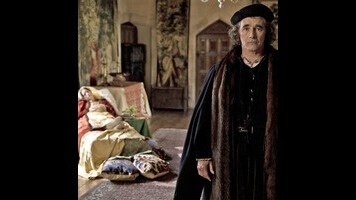In Tudor drama series Wolf Hall, power stays hungry

The greatest strength of Hilary Mantel’s novel Wolf Hall and its sequel, Bring Up The Bodies (two books in a proposed trilogy) is tone. It’s no secret that Henry The VIII’s reign was a tumultuous one, full of internal squabbling and political strife, but instead of putting emphasis on the drama, Mantel keeps things personal and melancholy. The novels follow Thomas Cromwell in his rise to power from lowly commoner to confidant of the king. There’s backstabbing, manipulation, and sexual negotiation throughout, and Mantel doesn’t shy away from the details. But while the details are engaging, the result is less a thriller than a character study about a man negotiating the currents of the history while remaining entirely at their mercy. In finding new ways to keep the past immediate and pressing, Mantel delivers something distinct: tragic events, without the tragedy.
The BBC’s six-part adaptation of Mantel’s books does an impressive job of maintaining that tone, and a large part of its success comes in the casting. Thomas Cromwell dominates the novels, and his perspective on events shapes how readers interpret them; translating that perspective to the screen, which is typically more democratic in its viewpoint, raises a challenge. The series manages this by having Cromwell present in almost every scene, subtly framing each conversation through his eyes even when he isn’t a direct participant. This wouldn’t be nearly as effective with a lesser actor in the role, but Mark Rylance is perfectly cast as the blacksmith’s son working for (and against) some of the bluest blood in the land.
It’s his face, really; a hangdog expression that initially appears as the look of a not-too-bright man who wandered in off the street and is at a loss as to what he’s supposed to do next. As the show progresses, it becomes more and more obvious that the blank look Rylance adopts for many scenes is a cover for a quick, and above all practical, mind. His Cromwell is a smart man struggling to find a balance between expedience and human decency—someone without the training or ancestry of his peers, but with enough common sense and cunning to make up the difference. And yet even his successes are tinged with regret. The mournful air that haunts the series finds its heart in the few moments where Cromwell lets his guard down. He’s clever enough to do what needs doing, but has enough of a soul to feel pain at the bodies left in his wake.
The rest of the cast is equally well chosen. Jonathan Pryce, Bernard Hill, Mark Gatiss, and Claire Foy flesh out important figures, making sure they remain vivid in the midst of their endless plotting. Of particular note is Damian Lewis as Henry The VIII. Lewis’ opacity as a performer, his ability to appear at once duplicitous and utterly sincere, was used to great effect on Homeland, and it’s just as valuable here. His Henry is a king of seeming compassion and loyalty who is also more than willing to ostracize or doom anyone, man or woman, who displeases him. Turning Henry into an outright despot or a complete buffoon would’ve been too simple; as is, he’s a charismatic ruler with no real check on his authority. It’s easy to believe the men who serve him really do love him, even as they betray one another and struggle for his favor.
While Cromwell’s ascension (and what that ascension might cost him) is the series’ main theme, the framework is the dissolution of King Henry’s first marriage to Catherine Of Aragon, and his relationship with Anne Boleyn (Foy). It’s a story that’s been told on television before, but anyone looking for the soap opera theatrics of The Tudors is in for disappointment. While Wolf Hall doesn’t shy away from bedroom dealings, the effect is more anthropological than romantic; the pressures on Henry to produce a male heir, combined with his own insecurities and wandering eye, make for a clear-headed study of the limits of monarchal government, and the way that even the most powerful are ultimately at the mercy of their own biology. While the six episodes cover a fair amount of ground, the pacing is measured throughout, only really building up steam in the final hour. The series’ main flaw is that this thoughtful approach can occasionally lapse into tedium—with so much going on, and so little of it happening directly on screen, it’s possible to get lost in the measured voices and significant looks without knowing exactly why you should care.
Still, Wolf Hall’s efforts to capture the same mood as its source material ultimately serve it well. Anyone with a passing knowledge of history (or access to Wikipedia) will already know the eventual fates of Boleyn, Cromwell, and the rest, but that knowledge enhances the show’s gloomy intensity. These people are trapped by the demands of monarchy and power, but the inevitability of their fates does not prevent them from struggling to survive, and, more importantly, does not render their struggle static or unmoving. The end result is to humanize individuals long dead, fighting to stay alive and prosper even as their doom closes slowly around them.